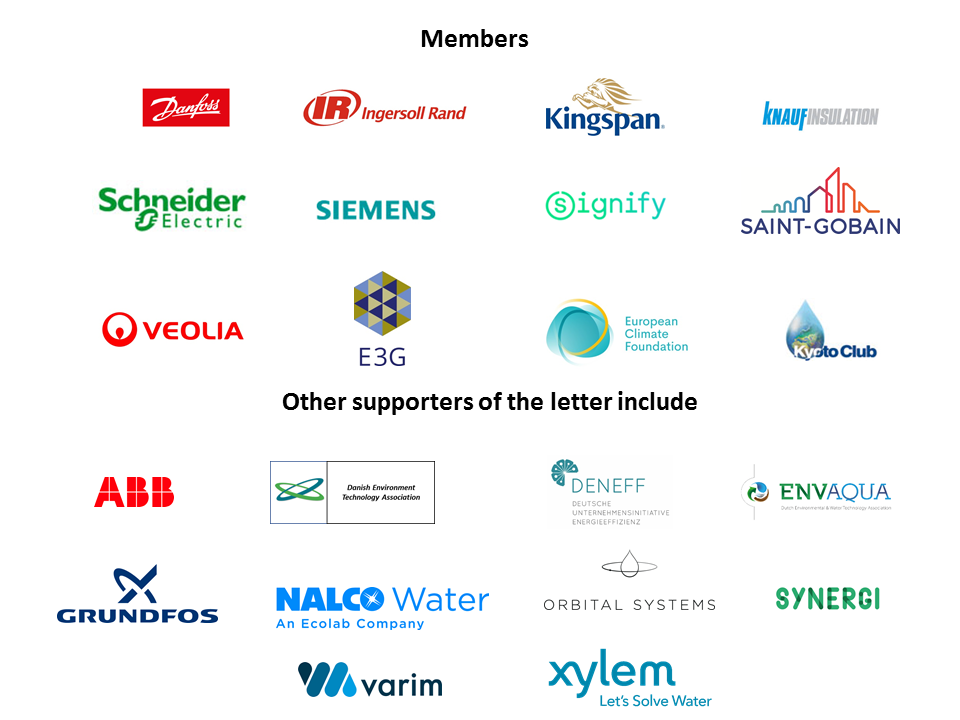To the kind attention of Elisabeth Köstinger
Federal Minister for Sustainability and Tourism of Austria
Cc: 28 Ministries for the Environment and for Energy of the EU
Dear Minister Köstinger,
RE: “Quality of water intended for human consumption. Recast”
I am writing to you on behalf of the European Alliance to Save Energy (EU-ASE) and a broader coalition of businesses operating in the water sector. EU-ASE is a multi-sectoral business organisation whose members operate across the 28 Member States of the European Union, with an aggregated annual turnover of €115 bn, directly employing 340.000 people in Europe.
We welcome the collaborative and fast-paced work of the European Parliament on the recast of the Drinking Water Directive. The recast is a historic first step to fix a missing dimension of the water regulatory framework, which is the energy-water nexus. There is a huge energy savings potential in the water sector that must be untapped to contribute towards securing the objectives of the Paris Agreement.
Water leakage reduction
On the outcomes of the European Parliament report, we were encouraged to see that there is a clear direction to reduce water leakage and save the energy required to pump and distribute billions of cubic meters of water that are lost through leaking pipes every day. The Commission estimates that in average 23% of treated water in the EU is lost in public water supplies; in some municipalities the leakage rates can rise up to 60%[1]. This can be fixed and leakage can be reduced by at least 30-40% replacing pipes and/or using energy efficiency technologies to monitor water distribution.
In this perspective we welcome and support:
- The inclusion of a requirement to assess leakage levels and the adoption of 2030 national leakage reduction targets for water suppliers by 2022 at the latest
- The inclusion of transparency requirement on leakage levels for large and very large water suppliers
- The obligation of water suppliers to reference the risks stemming from leaky pipes in water safety plans
Energy performance transparency requirements
On the other hand, the European Parliament report fell short to keep the transparency requirements on the energy performance of water suppliers, originally included in the European Commission proposal. It was a missed opportunity for the drinking water sector to transition towards a more energy efficient and carbon-neutral operation and to attract investments.
The energy consumption of the EU water sector represents the equivalent of 3.5% of the EU electricity consumption[2]. In municipalities, water and waste water facilities account for the largest consumption of electricity, representing 30-40% of local authorities’ total electricity bill[3]. It is realistic to cut the energy use of the water and waste water sector by 50%, yet investments are below their cost-optimal levels to achieve this level of reduction.
From this perspective, we call for the information on the energy performance of water suppliers to be available online for the local governments and decision makers and on request for ESCOs or market players willing to invest in energy savings programs. This will:
- provide useful information on the energy used from raw water extraction to tap delivery, i.e. across the whole water supply chain
- enhance transparency on the energy use of the drinking water sector
- build baseline of energy use that will enable the detection of opportunities of investments towards innovation and more energy efficient model.
Dear Minister, as technology and solutions providers in energy efficiency and water, we urge the Austrian Presidency and all the 28 Member States of the EU to:
- Match the European Parliament’s ambition on water leakage
- Support the European Commission’s proposal on energy performance transparency requirements
- Accelerate the adoption of a general approach on this strategic file in view of reaching a deal under the current political cycle
This is an urgent matter and we should act without delay – reducing energy waste in the water sector makes economic and environmental sense as it delivers tangible, multiple and collective benefits to European citizens, households and local authorities.
More information on how to unleash the energy efficiency potential in the EU water sector are included in a position paper downloadable here
We remain at your disposition for further discussion on this strategic topic.
Yours sincerely,
Monica Frassoni
President of the European Alliance to Save Energy (EU-ASE)
[1] IMPACT ASSESSMENT Accompanying the document Proposal for a Directive of the European Parliament and of the Council on the quality of water intended for human consumption (recast)
[2] IEA (2016), WEO-2016 Special Report : Water-Energy Nexus
[3] Ibid

